 First of all, hats off to nearly 100 teachers who took time out of busy schedules to answer my two survey questions recently. The first question asked teachers where they were in their personal implementation of the Common Core Math Standards. The second question was:
First of all, hats off to nearly 100 teachers who took time out of busy schedules to answer my two survey questions recently. The first question asked teachers where they were in their personal implementation of the Common Core Math Standards. The second question was:
“What are your top two questions about how to implement the Common Core Math Standards in your classroom?”
Finding Time and Filling the Gaps
As I analyzed the results I discovered two main themes. One of the themes, which I will delve into in this post, is centered around how to find time to successfully implement the Common Core math standards, especially considering that teachers are also charged with filling the gaps in student knowledge. These gaps are either caused by a lack of past student learning or the difficult transition that can occur when implementing the new curriculum.
Time to Implement the Common Core Math Standards Effectively
Here is a representative sample of the survey comments that center on finding time to implement the Common Core Math Standards.
“How do teachers find time to implement all that is involved in common core?”
“How to do the entire CCM Standards (for one grade level) in one school year.”
“How do I avoid teaching ‘skinny’ lessons, or supplemental lessons, if the students haven’t mastered a skill necessary for the common core standard of the day/week/month? It is important to stay on schedule, but just as important to make sure students know all skills!”
“How could I integrate multiple CC standards into lessons so I can get everything covered in just one year?”
“How do I constantly review?”
“Finding time as many students coming in aren’t ready to jump into gr 7 skills and its hard to just jump in”
“Do I have time to fill the gaps and be ready for Common Core testing in March?”
“Can we get through the entire curriculum in a year?”
Gaps in Student Mathematical Learning
Another factor that definitely plays into a potential lack of time is the need for time to address gaps in student knowledge and to provide intervention for identified students.
Here is a representative sample of survey comments that had to do with the need for intervention and filling gaps in student understanding of mathematics.
(How do you) “Keep moving on in the curriculum even if the students do not really ‘Get IT’, but our ‘admin’ wants the syllabus followed.”
“What to do for students not on grade level. I need remediation programs for each domain that can be used for RTI.”
“How to address gaps in student knowledge- bc of poor transition to new curriculum. What if it is too difficult for some of my students.”
“How do I remediate?”
“1) lack of time for remediation”
“What do I do about students whose pre-requisite skills prevent them from accessing grade level curriculum?”
“What gaps do we need to fill in for our students in order for them to be successful?”
“What is the best way to ensure a smooth transition, without students falling behind or missing out on skills?”
“How do we spiral review throughout the year to ensure mastery?”
“Do I have time to fill the gaps and be ready for Common Core testing in March?”
“What other programs can I combine with common core for a strong substantial backup for review and assessment?”
My View After Teaching Math for Over 25 Years…And My Answer
I’ve taught through a number of curriculum pendulum swings in my quarter of a century in the math classroom. Sometimes basic skills have been emphasized. At other times problem solving and active learning were given priority and basic skills were secondary. Now Common Core is here with its emphasis on mathematical practices, rigorous tasks, communication, justifying your thinking, etc.
In many ways I believe that the Common Core Math Standards do encourage our students to really learn and understand mathematics, rather than just memorize mathematical procedures. However, foundational to all mathematical work is proficiency in the key basic skills that will allow students to solve problems and complete mathematical tasks.
I share many of the same questions and concerns voiced by the math teachers in the quotes above. And…based on my experience in the classroom and success with a state-based warm-up program that my district purchased…I decided to create my own Common Core Math Warm-Up Programs for grades 5-8.
In the summer of 2013 I wrote the 6th and 7th Grade Math Common Core Warm-Up Programs. This year, in the summer of 2014, I wrote the 5th Grade Program and am just finishing up the final touches on the 8th Grade Program.
The Program I Created to Answer the Questions Above For Myself
I created these programs because I believe that these Warm-Up Programs provide the needed foundation for students to succeed and prosper in the math classroom as we implement the Common Core Math Standards.
Program – I created these warm-up programs for each grade level very systematically, making sure that the vast majority, if not all, of the common core math standards are covered in each grade level program.
Foundation – 120 daily warm-ups with 5 problems each day provide a solid foundation for students as they learn the grade level common core math standards. With this foundation students are equipped to do the heavy lifting on problem solving activities and rigorous tasks.
Time – In about 8-10 minutes a day the Common Core Warm-Up Programs cover most, if not all, of the key concepts for that grade level and provide multiple exposures over the course of the year. This is time well spent!
Spiral Review – Multiple exposures to the key grade level common core standards will increase student retention.
Filling the Gaps – The grade level gaps get filled because students are not taught a key math concept once and then given a quick review right before the national assessment. Students revisit the key standards throughout the year.
Results – It is illegal for me to promise you specific results, but we all know from our experience as math teachers that repeated exposures to key concepts over time, as provided by the spiral review format of the Common Core Math Warm-Up Programs, will be much more effective than teaching concepts once in a linear fashion.
Impact – 600 Common Core Warm-Up Problems spread out over the course of 120 days, with the quality input of the teacher as you discuss the answers, will have a huge impact on the mathematical learning of your students.
Your Opportunity is Coming Within the Next Few Days!
The 5th Grade and 8th Grade Math Common Core Warm-Up Programs will be released within the next few days and there will be a limited time opportunity to get these two powerful programs at a significant savings. To include everyone, I will also be applying this opportunity to the 6th and 7th Grade Math Common Core Warm-Up Programs.
I spent about 60 hours creating each of these powerful programs during the past two summers. You will have the chance to download them in a few days and start impacting the learning of your students immediately.
Keep an eye out for the next Middle School Math Treasures email…Equip yourself to provide a powerful Common Core foundation for your students in just a few minutes a day.
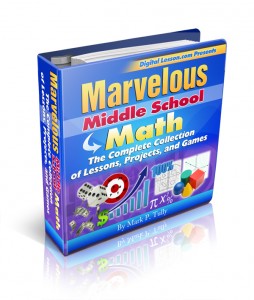
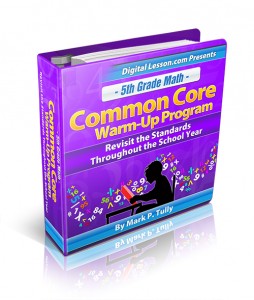
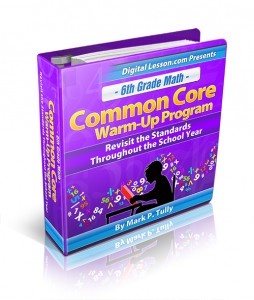
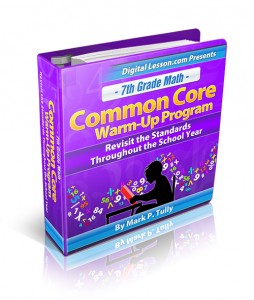
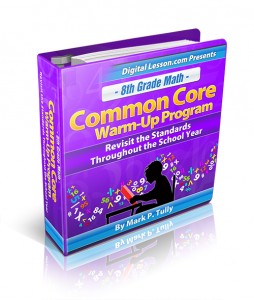




Speak Your Mind